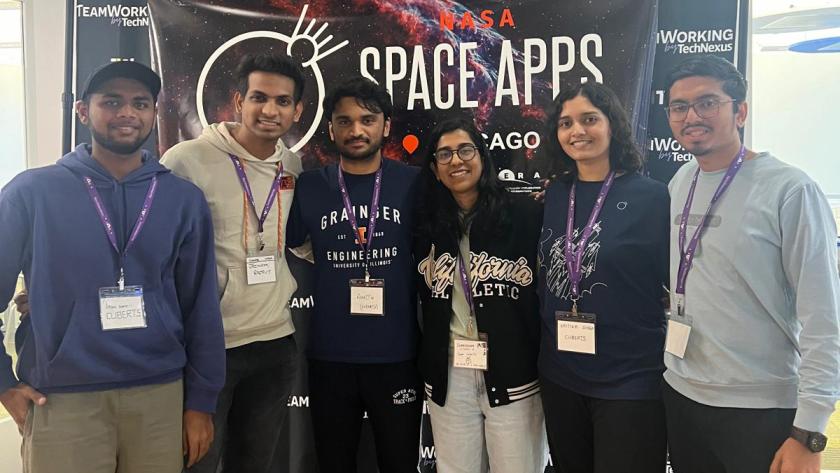A team including MSIM students Kritika Singh and Jainam Rajput won the Chicago hackathon of the NASA Space Apps Challenge, which was held in over 450 locations worldwide on October 5-6. The students partnered with computer science master's students Shraddhaa Mohan, Jinang Gandhi, and Sai Krishna Rohith Kattamuri and engineering in autonomy and robotics master's student Jugal Bipinkumar Upadhyay to form Team Cuberts.
At the annual hackathon, teams used their problem-solving skills to tackle challenges in STEM, such as astrophysics, software development, technology, and space exploration. The challenge for Team Cuberts was "Leveraging Earth Observation Data for Informed Agricultural Decision-Making."
"For the first five or six hours, we struggled with decoding the massive amounts of NASA satellite data. Then we pondered how to actually use it for our problem statement. Slowly, things started taking shape and our project was born," said Singh.

The team's project, Canopy, is a farmer-centric website that addresses water-related challenges faced by farmers, such as unpredictable weather, droughts, floods, and inconsistent water availability. According to Singh, Team Cuberts developed a website that leverages NASA Earth observation data, including groundwater runoff, temperature, and water levels over the past ten years, to provide farmers with actionable insights.
"Canopy simplifies access to complex NASA datasets and integrates AI to offer tailored recommendations on crop suitability, irrigation strategies, soil management, and water conservation, based on a farmer's specific location," she said. "It is a crucial solution that empowers farmers with data-driven decision-making tools, leading to enhanced crop yields, efficient water resource use, and more sustainable farming practices, ultimately supporting food security. The website aims to bridge the gap between available satellite data and practical farming applications, making cutting-edge technology accessible to those who need it most."
More than 200 participants competed in the 48-hour hackathon, which also featured industry speakers and networking opportunities. Projects were judged by representatives from Google, Optiver, StoneX, Microsoft, Fermilab, Cboe, CIERA Northwestern, Uniphore, and Highlight. Team Cuberts beat 34 teams to win the Judges' Choice Award and be selected as a Global Nominee.
During the global judging, a team of expert judges from NASA and the 2024 Space Agency Partners will review the Global Nominees and select Global Finalists. Results will be announced on social media and the NASA Space Apps Challenge website on November 19.